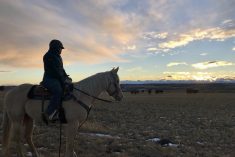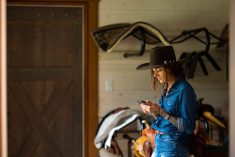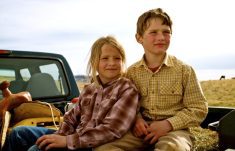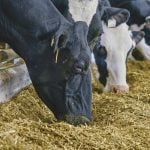When Doreen Blumhagen was starting her family, the farm was where she wanted to be.
Blumhagen and her husband, Shannon, own and operate their farm near Halkirk, Alta., where they have grown crops and raised cattle for over 30 years.
The sprawling, flat prairie dotted with wind turbines and herds of cattle is where Blumhagen raised her children, and where she and her husband have made their living.
Read Also
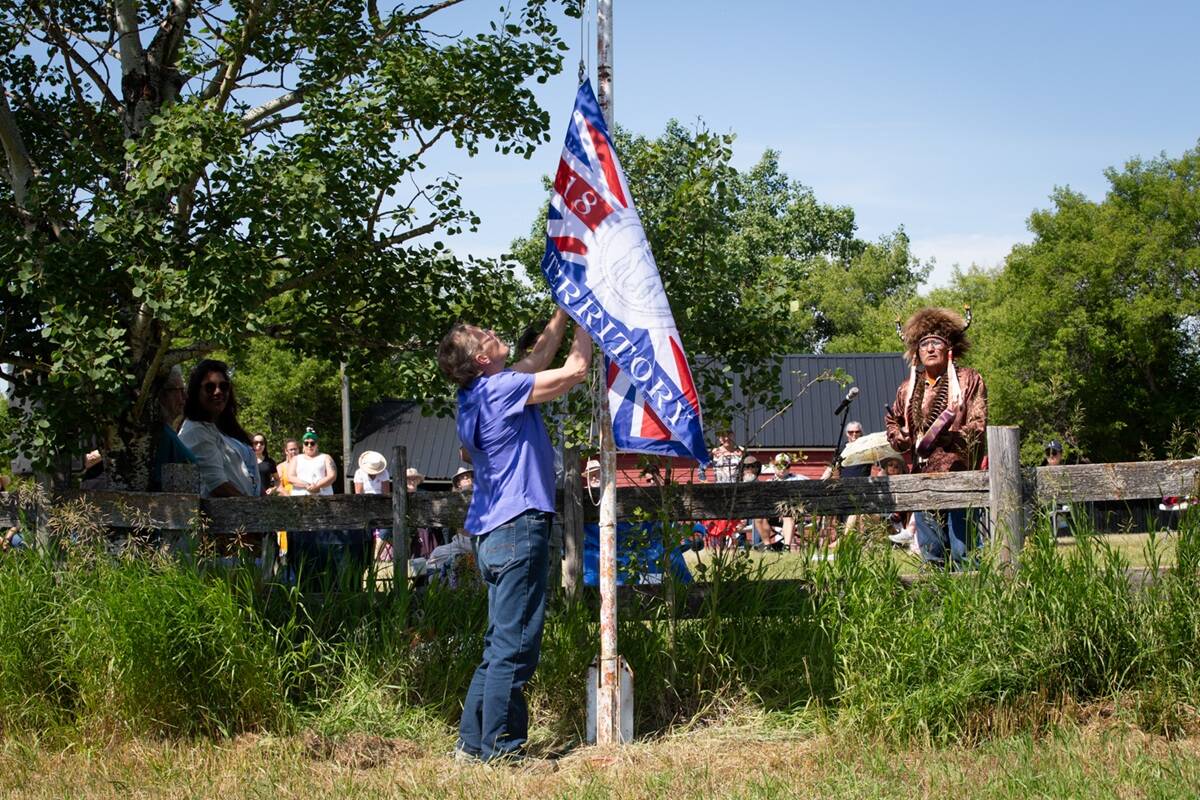
Treaty Land Sharing Network expands reach in Saskatchewan and Alberta
The Treaty Land Sharing Network, which connects land holders with First Nations and Metis people, has expanded since it began in 2018
Now, with retirement looming, the Blumhagens are looking at a succession plan with neither of their kids interested in taking over the farm — meaning Doreen Blumhagen will have to leave it all behind.
However, the thought of leaving the farm comes with a variety of emotions.
Country Road Chats
Blumhagen’s previous experience with mental illness made her prioritize her well-being while starting the succession planning process.
She was diagnosed with postpartum depression, and had to spend time in the hospital to recover. Since then, she has also been diagnosed with clinical depression and anxiety.
“I was very sick,” she says. “But it was also the turnaround for me to pay attention to my mental health and realize that these are the cards I’ve been dealt, and it’s treatable. And I can learn and make myself better.”
She says as she was working to improve her mental health, she was told she should not speak about it in public.
Now, through her company Country Road Chats, she presents about mental health. By doing so, Blumhagen hopes to change the narrative so mental health is easier to talk about, specifically in the ag sphere.
“I hope to be contributing to that by saying, ‘No, we do need to talk about this,’ because we all have very similar feelings and different extremes. And it’s part of the community, it’s part of belonging and acceptance and understanding, empathy.”
On her operation, talking openly with her husband about their succession plan and how their mental health is during the entire process is just as important as anything else.
“Mental health is part of our plan. It’s just as important as our financials, as our machinery, as our cow herd, as our equipment.”
Mental health on the farm
The mental health of producers is a big conversation in the media due to factors inherent to farming and ranching. A study done at the University of Guelph by Andria Jones-Bitton found the mental health of producers is worse than that of the general public.
This study consisted of a survey in 2021 that polled around 1,200 producers and which found 76 per cent of producers were experiencing moderate to high stress levels.
Jones-Bitton also found in the 12 months of 2021, one in four farmers had suicidal thoughts.
Main contributors to high stress levels included weather, seclusion, workload and the costs of running and maintaining their operation.
Many provinces have resources available for producers who are struggling with mental well-being: in Saskatchewan, there is the Do More Agriculture Foundation, as well as the Farm Stress Line as part of Mobile Crisis Services. Alberta has Agknow and Manitoba has the Farmer Wellness Program.
Lauren Van Ewyk is a psychotherapist and the CEO of the National Farmer Mental Health Alliance. She’s also a farmer herself, running a small sheep herd at her home in western Ontario with her husband.
As a farmer, Van Ewyk knows the challenges the industry poses to mental health.
“I think farmers are taught from a pretty young age that you’ve got to be resilient. You’ve just got to kind of pick yourself up by your bootstraps and keep going and work harder,” Van Ewyk says. “And we really believe that if we work harder, we have higher production and higher production means more value. And, unfortunately, that’s not necessarily the case.”
However, succession planning is another thing affecting mental health — and one that is often complicated to deal with.
Succession planning strain
Succession planning is a double-edged sword. It’s complicated and strenuous, but producers need to go through it for the sake of the operation and their own futures.
Van Ewyk says succession planning can negatively affect a producer’s mental health because it combines a business relationship with a personal relationship.
She says transition planning also often brings with it role changes for many people on the operation, which can be hard on their identities. A role change can be very threatening, she adds.
Blumhagen echoes this statement, saying there isn’t just grief when you lose a loved one but when you lose anything significant. No longer filling your role on the farm or the place you had once called home can bring grief, even if you feel ready to be done “pulling calves and working 12-hour days,” she says.
“It’s still a bit of a loss of youth, and your everyday life and what you wanted to do forever, because nothing is forever.”
Van Ewyk says trauma also plays a part in the strenuous nature of succession planning.
Van Ewyk says there is research showing many who emigrated during or after World War II suffered trauma from war and moving to a new country. She says often immigrants wouldn’t accept government handouts, or any government help, for fear the government would take away their farms and livelihoods.
Although this phenomenon is poorly reported in Canada, multiple international studies have documented it. In Canada, Adam Roffel of the University of Windsor touched on this issue as he researched Dutch people immigrating to rural Ontario following the Second World War.
Van Ewyk says even now, a continued sense of ownership is important to producers who followed those first generations.
“Trauma is actually carried in the DNA for three or four generations,” Van Ewyk says. “And so it has impacted relationships from long ago. And what we’re seeing is those individuals who started those farms post-World War II… some of that impact of trauma really plays a deep role in the succession plan.”
She says another challenge is only around 33 to 34 per cent of farms have succession plans. Those who do generally don’t update their plans regularly.
“It’s kind of like, you have a small, little hole in the dam, and you don’t maintain it,” Van Ewyk says. “And before you know it, the river has washed out the road.”
Coping strategies
Van Ewyk and Blumhagen say there are things producers can do to cope with a decline in their mental health while working on a succession plan.
Van Ewyk and Blumhagen say there are things producers can do to cope with a decline in their mental health while working on a succession plan.
Van Ewyk recommends starting a succession plan early and maintaining it through the years as the farm changes and kids grow up.
“If you have a 12-year-old child, you need to start a succession plan,” Van Ewyk says. “Start early, make it part of your conversation. Because what happens is we see people get to the end of their life and suddenly they’re saying, ‘No, I only want my one child to take over the whole farm to keep it in the family name,’ which catches everyone off guard.”
She says it’s helpful to everyone involved in the family farm if there is an open conversation about what the succession plan looks like before something happens. Doing otherwise could lead to tense moments, or worse. Businesses can’t survive a lack of communication from those in leadership, she says.
For those struggling with succession plans, Blumhagen says to listen to your instincts.
“Listen to your heart and listen to your gut,” Blumhagen says. “If something doesn’t feel right, it’s probably not according to your morals and your values.”
Both Van Ewyk and Blumhagen suggest farming families work with professionals in the succession planning space, as well.
Ag-informed therapy
Producer mental health is complicated — Van Ewyk knows that better than anyone. That’s why, through her work with the National Farmer Mental Health Alliance, Van Ewyk has been working on agriculturally informed therapy, which trains therapists on specific needs and issues relevant to producers who may be coming in for help.
She says too often, producers must explain the realities of the industry to therapists who don’t understand.
“There are some perceptions out there that farmers are really wealthy and they only work twice a year,” Van Ewyk says.
She says the intention is when a farmer goes into a therapy session, their therapist is already informed of the main struggles of the agricultural industry. Therapists are also aware of issues specific to what is going on in their region, such as drought and flooding, or things specific to the industry, such as succession planning.
“It allows for an understanding between the therapist and the farmer that adds to the helpfulness of that relationship rather than a farmer spending money on a clinical session where they spend that time educating the clinician.”




